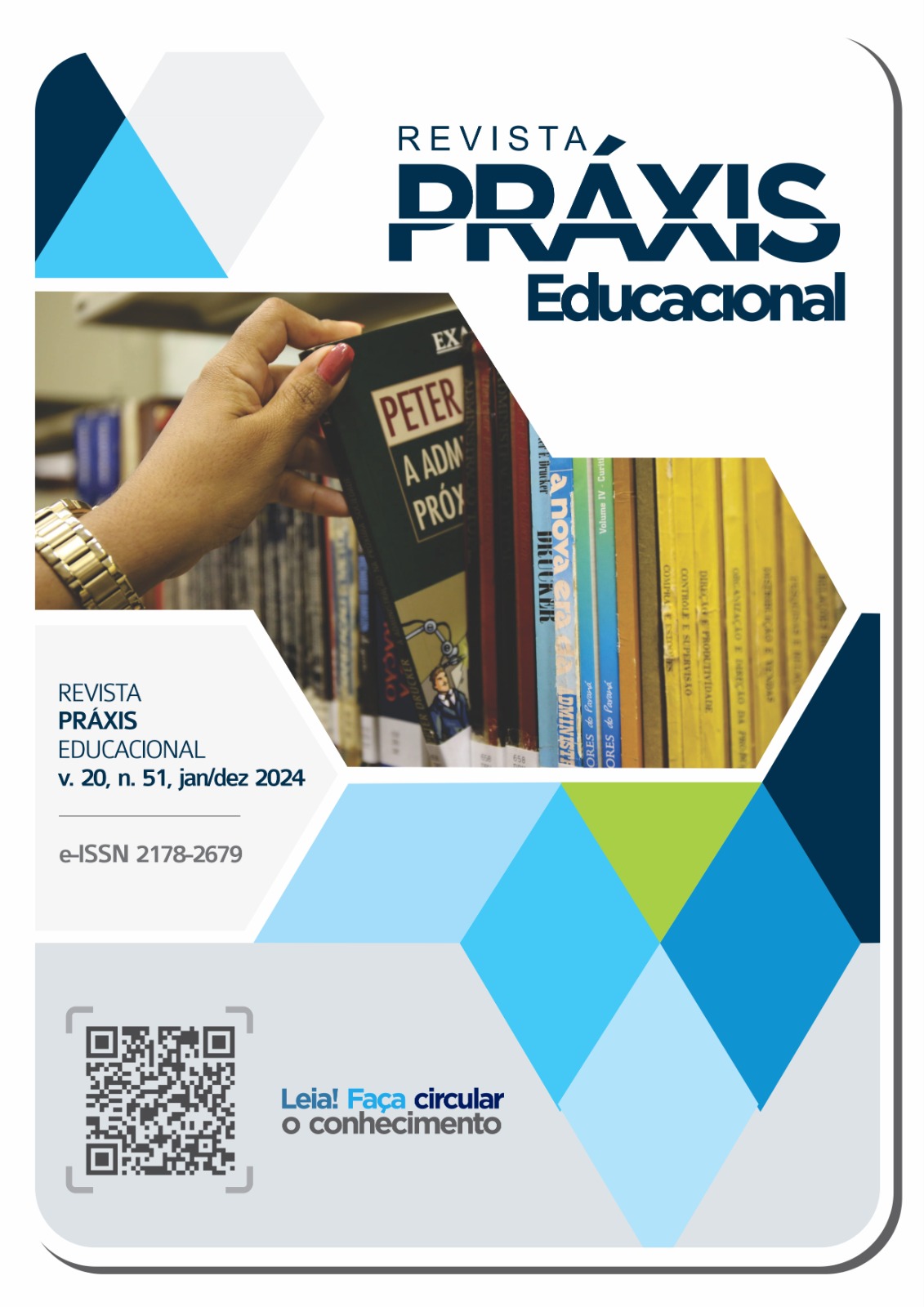The skill for critiquing
DOI:
https://doi.org/10.22481/praxisedu.v20i51.13965Keywords:
criticism, colonialism, positionality, ethics, modernityAbstract
This essay aims to problematize how social life in classical Greek philosophy and in modern philosophy was the object of philosophical reflection, culminating in affirming the analytics of truth as a superior criterion for criticism. From this question, we problematize the relations between these analytics of truth and colonialism or the centrality of the white cisheteressexual, bourgeois and European man, as a criterion of well living or living correctly. Through a bibliographic discussion based on some works of modern and contemporary philosophy that tried to oppose this abstract and universalist dimension of the analysis of truth, we indicate that certain colonial traces still have repercussions in them. To conclude, the essay systematizes clues or paths for the development of what we call critical competence, collecting contributions from philosophy, psychoanalysis and anthropology to affirm it as critical pan-perspectivism and as the gestation of new worlds.
Downloads
Metrics
References
ARISTÓFANES. Nas nuvens. Cadernos de tradução, Porto Alegre, nº32, jan/jun. 2013.
AGAMBEN, Giorgio. Magia e felicidade In: AGAMBEN, G. Profanações. São Paulo: Boitempo, 2007.
DELEUZE, Gilles. O quem dizem as crianças. In: DELEUZE, G. Crítica e clínica. Tradução de Peter Pal Pélbart. São Paulo: Editora 34, 1997.
DELEUZE, Gilles. Diferença e repetição. São Paulo: Graal, 1988.
DELEUZE, Gilles.; GUATTARI, Félix. O antiédipo. São Paulo: Ed. 34, 2010.
DESCARTES, René. As meditações. São Paulo: Nova Cultural, 1999.
DESCARTES, René. Tratado das paixões da alma. São Paulo: Nova Cultural, 1999a.
DEWEY, Jhon. Como pensamos. Como se relaciona o pensamento reflexivo com o processo edu cativo: uma reexposição. São Paulo: Cia Editora Nacional, 1959.
EUGENIO, Fernanda; FIADEIRO, João. Jogo das perguntas: o modo operativo "AND" e o viver juntos sem ideias. Fractal, Rev. Psicol., Rio de Janeiro, v. 25, n. 2, aug. 2013.
FOUCAULT, Michel. O que são as luzes? In:FOUCAULT, M. Ditos e escritos II. Arqueologia das ciências e história dos sistemas de pensamento. Tradução de Elisa Monteiro. Rio de Janeiro: Forense Universitária, 2000.
FOUCAULT, Michel. O sujeito e o poder. In: FOUCAULT, M. Microfísica do Poder. Trad.: Ro berto Machado. Ed. 24º. Rio de Janeiro: Edições Graal, 2007.
FOUCAULT, Michel. El gobierno de los vivos y de los otros. Buenos Aires: Fondo de cultura económica, 2009.
HARAWAY, Donna. Saberes localizados: a questão da ciência para o feminismo e o privilégio da perspectiva parcial. Cadernos Pagu, n.5, p.7–41, 2009. Disponível em: https://periodicos.s bu.unicamp.br/ojs/index.php/cadpagu/article/view/1773. Acesso em: 06 mar. 2023.
KANT, Imannuel. Crítica da Razão Pura. São Paulo: Ed. Nova Cultural, 1999.
KANT, Imannuel. Crítica da Razão Prática. Lisboa: Edições 70, 2017.
KANT, Imannuel. Crítica da faculdade do juízo. In: DUARTE, R. O belo autônomo: textos clássicos de estética. Belo Horizonte: Autêntica editora, 2013.
KANT, Imannuel. Fundamentação da metafísica dos costumes. São Paulo: Abril Cultural, 1980.
KASTRUP, Virginia. O funcionamento da atenção no trabalho do cartógrafo. Psicologia & Sociedade, vol. 19, n. 1, jan-abril, p15-22, 2007.
KASTRUP, Virginia.; TEDESCO, Silvia.; PASSOS, Eduardo. Políticas da cognição. Porto Alegre: Sulina, 2008.
LATOUR, Bruno. Jamais fomos modernos. Rio de Janeiro: Editora 34, 1994.
MANFREDI, Valério. M. Akropolis: a grande epopéia de Atenas. Porto Alegre: L± Rio de Ja neiro: Rocco, 2010 .
MARX, Karl; ENGELS, Friereich. A Ideologia Alemã (Feuerbach). 3ª Edição, São Paulo: Hucitec, 1991.
MATURANA, Humberto. VARELA, Francisco. A árvore do conhecimento: as bases biológicas da compreen são humana. São Paulo: Palas Athena, 2001.
NIETZSCHE, Friederich .Assim falou Zaratustra: um livro para todos e para ninguém. São Paulo:Companhia das Letras, 2011.
PLATÃO. A república. Rio de Janeiro: Ediouro, 1996.
PLATÃO. Fédon. In: Os pensadores. São Paulo: Abril cultural, 1983.
PLATÃO. Teeteto. Lisboa: Fundação Calouste Gulbenkian, 2010.
PRECIADO, Beatriz. P. Manifesto contrassexual: práticas subversivas de identidade sexual. São Paulo: N-1 Edições, 2014.
ROLNIK, Suely. Esferas da Insurreição: Notas para uma vida não cafetinada. São Paulo: n-1 edições, 2019.
SIMONDON, Georges. A individuação à luz das noções de forma e informação. São Paulo: Editora 34, 2020.
STIEGLER, Bernard. What makes life worth living: on pharmacology. Cambridge: Polity Press, 2013.
TIERNO, Patrício. O pensamento político dos filósofos milésios. Lua Nova, São Paulo, n. 100, p. 363-404, 2017. Disponível em: http://www.scielo.br/pdf/ln/n100/1807-0175- ln-100-00363.pdf. Acesso em 30 mar. 2023.
WHITEHEAD, Alfred N. Proceso y realidad. Buenos Aires: Losada, 1956.
WINNICOTT, Donnald. O brincar e a realidade. São Paulo: Ubu Editora, 2019.
VARELA, Fransico.; THOMPSON, Evan.; ROSCH, Eleanor. The embodied mind: cognitive science and human experience. Cambrigde, Mass: MIT, 1991.
VARELA, Francisco. Sobre a competência ética. Trad. Artur Morão. Lisboa: Edições 70. 1992.
VARELA, Francisco . O círculo criativo: esboço histórico-natural da reflexividade. In: WATZ LAWICK, P. A realidade inventada. Campinas: Editorial Psy II, p. 302-316, 1994.
VIVEIROS DE CASTRO, Eduardo. Metafísicas Canibais: Elementos para uma antropologia pós estrutural. São Paulo: Cosac & Naify, 2015.
Downloads
Published
How to Cite
Issue
Section
License
Copyright (c) 2024 Práxis Educacional

This work is licensed under a Creative Commons Attribution 4.0 International License.
You are free to:
Share - copy and redistribute the material in any medium or format; Adapt - remix, transform, and build from the material for any purpose, even commercially. This license is acceptable for Free Cultural Works. The licensor cannot revoke these freedoms as long as you follow the terms of the license.
Under the following terms:
Attribution - You must appropriately give credit, provide a link to the license, and indicate if any changes have been made. You may do so in any reasonable way, but not in a way that suggests that you or your use is endorsed by the licensor.
There are no additional restrictions - You cannot apply legal terms or technological measures that legally restrict others to make any use permitted by the license.










